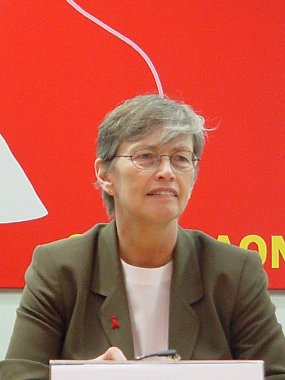2007.04.05: April 5, 2007: Headlines: Directors - Bellamy: Figures: Directors: Unicef: United Nations: COS - Guatemala: AIDS: AIDS Education: The Oracle: Carol Bellamy spreads word about AIDS prevention
Peace Corps Online:
Peace Corps News:
Directors of the Peace Corps:
Carol Bellamy:
January 23, 2005: Index: PCOL Exclusive: Peace Corps Directors - Bellamy :
Carol Bellamy: Newest Stories:
2007.04.05: April 5, 2007: Headlines: Directors - Bellamy: Figures: Directors: Unicef: United Nations: COS - Guatemala: AIDS: AIDS Education: The Oracle: Carol Bellamy spreads word about AIDS prevention
Carol Bellamy spreads word about AIDS prevention

Former USF President Betty Castor introduced Carol Bellamy Wednesday afternoon by asking how many people in the audience were returned Peace Corps volunteers. The large number of raised hands that answered her question proved the influence of the Peace Corps, which Bellamy once led Bellamy was also the President of UNICEF for 10 years. Although she has been called a "radical feminist" by her critics, she has achieved success in the field of international relief and development. Before entering this field, Bellamy was an investment banker and politician, as well as the first woman President of the New York City Council. "We're celebrating a terrible anniversary," she said. "It's 25 years since the discovery of AIDS - and it's not going away." According to Bellamy, the answer to this is leadership. "Leadership. Leadership plays a role," she said. "Life is about choices. Poverty doesn't just come out of nowhere, AIDS doesn't spread through the air, war just doesn't happen. It's about choices. The world has to be better prepared to hold leadership accountable." Carol Bellamy was the first returned Volunteer (Guatemala 1963–65) to be confirmed by the Senate as director of the Peace Corps.
Carol Bellamy spreads word about AIDS prevention
Former Peace Corps leader spreads word about AIDS prevention
By: Christine Gibson, Staff Writer
Issue date: 4/5/07 Section: News
Former USF President Betty Castor introduced Carol Bellamy Wednesday afternoon by asking how many people in the audience were returned Peace Corps volunteers.
The large number of raised hands that answered her question proved the influence of the Peace Corps, which Bellamy once led Bellamy was also the President of UNICEF for 10 years. Although she has been called a "radical feminist" by her critics, she has achieved success in the field of international relief and development. Before entering this field, Bellamy was an investment banker and politician, as well as the first woman President of the New York City Council.
When she began at UNICEF, New Yorkers would stop her on the street, recognizing her from her days in city government, and ask her how it felt to be out of politics.
"I'm at the UN," she would say. "I'm not out of politics."
When discussing her passion of putting an end to the poverty that plagues two million people globally, Bellamy couldn't help but address the role of the United States.
"We live in an incredible country, but it's a very inward-looking country," she said. "Our international news really stinks, frankly. If you want to get a story on the international news, you need to have the word 'terrorism' in there."
Specifically, Bellamy takes issue with the United State's silence on some major humanitarian problems.
"I suspect that if the entire state of Michigan dies within the course of a year, someone would notice."
She went on to say that Michigan has a population of 10 million.
"In 2007, 10 million children under the age of 5 will die from preventable diseases like dehydration, malaria and measles. That's 39,000 children under the age of 5 dying every day."
She pointed out that the United States gives less than 1 percent of its budget to international aid, and 50 percent of that aid goes to six countries - all of which are allies in the War on Terror.
Bellamy is passionate about education for women and girls. She praised Nobel Peace Prize Winner Mohammed Yunus - but was quick to point out that Yunus didn't discover microcredit - he simply involved women in the process.
Her mantra is "Empower women and educate girls!"
"If you do that, you're going to have a dramatic impact," she said. "If you want a return on your investment, educate girls. That's it. If I did nothing else between now and when I kick the bucket, it would be that."
Women who receive an education are more likely to be in good health and less likely to be a victim of HIV/AIDS, she said. Bellamy recounted that the subject of HIV/AIDS is getting an increasingly "female face" because of power relations affecting women in developing countries. She said that AIDS is a global issue, not just an African issue.
"We're celebrating a terrible anniversary," she said. "It's 25 years since the discovery of AIDS - and it's not going away."
According to Bellamy, the answer to this is leadership.
"Leadership. Leadership plays a role," she said. "Life is about choices. Poverty doesn't just come out of nowhere, AIDS doesn't spread through the air, war just doesn't happen. It's about choices. The world has to be better prepared to hold leadership accountable."
Links to Related Topics (Tags):
Headlines: April, 2007; Carol Bellamy; Figures; United Nations; Peace Corps Guatemala; Directory of Guatemala RPCVs; Messages and Announcements for Guatemala RPCVs; AIDS; AIDS Education; Vermont
When this story was posted in April 2007, this was on the front page of PCOL:





Peace Corps Online The Independent News Forum serving Returned Peace Corps Volunteers
 | Chris Dodd's Vision for the Peace Corps
Senator Chris Dodd (RPCV Dominican Republic) spoke at the ceremony for this year's Shriver Award and elaborated on issues he raised at Ron Tschetter's hearings. Dodd plans to introduce legislation that may include: setting aside a portion of Peace Corps' budget as seed money for demonstration projects and third goal activities (after adjusting the annual budget upward to accommodate the added expense), more volunteer input into Peace Corps operations, removing medical, healthcare and tax impediments that discourage older volunteers, providing more transparency in the medical screening and appeals process, a more comprehensive health safety net for recently-returned volunteers, and authorizing volunteers to accept, under certain circumstances, private donations to support their development projects. He plans to circulate draft legislation for review to members of the Peace Corps community and welcomes RPCV comments. |
 | He served with honor
One year ago, Staff Sgt. Robert J. Paul (RPCV Kenya) carried on an ongoing dialog on this website on the military and the peace corps and his role as a member of a Civil Affairs Team in Iraq and Afghanistan. We have just received a report that Sargeant Paul has been killed by a car bomb in Kabul. Words cannot express our feeling of loss for this tremendous injury to the entire RPCV community. Most of us didn't know him personally but we knew him from his words. Our thoughts go out to his family and friends. He was one of ours and he served with honor. |
 | Peace Corps' Screening and Medical Clearance
The purpose of Peace Corps' screening and medical clearance process is to ensure safe accommodation for applicants and minimize undue risk exposure for volunteers to allow PCVS to complete their service without compromising their entry health status. To further these goals, PCOL has obtained a copy of the Peace Corps Screening Guidelines Manual through the Freedom of Information Act (FOIA) and has posted it in the "Peace Corps Library." Applicants and Medical Professionals (especially those who have already served as volunteers) are urged to review the guidelines and leave their comments and suggestions. Then read the story of one RPCV's journey through medical screening and his suggestions for changes to the process. |
 | The Peace Corps is "fashionable" again
The LA Times says that "the Peace Corps is booming again and "It's hard to know exactly what's behind the resurgence." PCOL Comment: Since the founding of the Peace Corps 45 years ago, Americans have answered Kennedy's call: "Ask not what your country can do for you--ask what you can do for your country. My fellow citizens of the world: ask not what America will do for you, but what together we can do for the freedom of man." Over 182,000 have served. Another 200,000 have applied and been unable to serve because of lack of Congressional funding. The Peace Corps has never gone out of fashion. It's Congress that hasn't been keeping pace. |
 | PCOL readership increases 100%
Monthly readership on "Peace Corps Online" has increased in the past twelve months to 350,000 visitors - over eleven thousand every day - a 100% increase since this time last year. Thanks again, RPCVs and Friends of the Peace Corps, for making PCOL your source of information for the Peace Corps community. And thanks for supporting the Peace Corps Library and History of the Peace Corps. Stay tuned, the best is yet to come. |
 | History of the Peace Corps
PCOL is proud to announce that Phase One of the "History of the Peace Corps" is now available online. This installment includes over 5,000 pages of primary source documents from the archives of the Peace Corps including every issue of "Peace Corps News," "Peace Corps Times," "Peace Corps Volunteer," "Action Update," and every annual report of the Peace Corps to Congress since 1961. "Ask Not" is an ongoing project. Read how you can help. |
Read the stories and leave your comments.

Some postings on Peace Corps Online are provided to the individual members of this group without permission of the copyright owner for the non-profit purposes of criticism, comment, education, scholarship, and research under the "Fair Use" provisions of U.S. Government copyright laws and they may not be distributed further without permission of the copyright owner. Peace Corps Online does not vouch for the accuracy of the content of the postings, which is the sole responsibility of the copyright holder.
Story Source: The Oracle
This story has been posted in the following forums: : Headlines; Directors - Bellamy; Figures; Directors: Unicef; United Nations; COS - Guatemala; AIDS; AIDS Education
PCOL36799
94

















